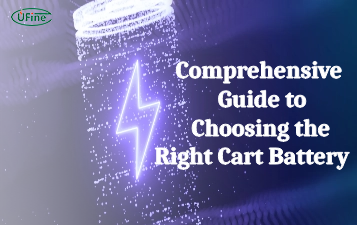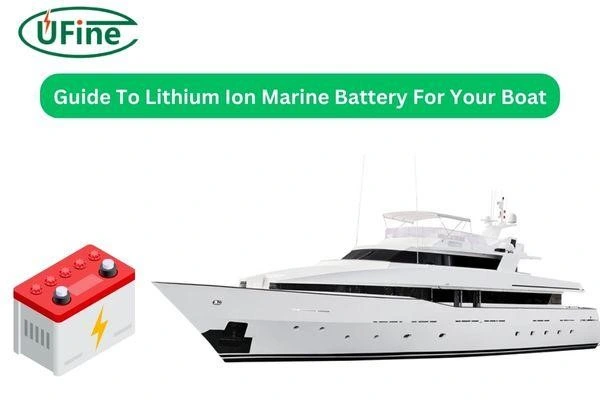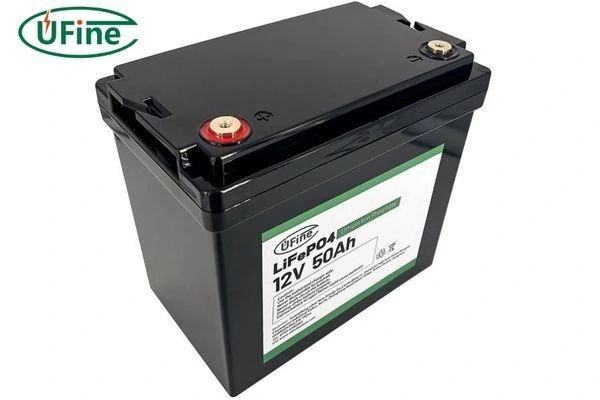Reliable boat power is very crucial for smooth navigation through rough waters. For many generations, boats have relied on lead-acid batteries. But with the adoption of new technology a lithium ion marine battery has become the first choice of each sailor. Therefore, in this article, we will elaborate on every factor that counts weight on the side of a lithium ion marine battery. You will find the advantages and purposes of installing lithium ion batteries for boats.
Part 1. What is a lithium ion marine battery?
A lithium ion marine battery is a rechargeable battery specifically designed for marine applications. Lithium-ion is the most advanced battery, has a higher energy density, and is lightweight.
The name of the battery, lithium ion, is the combination of two elements, lithium and ion. Lithium is the mobile ion in the battery, and ions indicate the charged particles that move between electrodes during the charge and discharge process. The ions take less time to charge and contain high-density power. Therefore, most of the boats use lithium ion batteries to manage the need for electrical power on the boats. They offer boat owners a reliable and efficient power solution for their marine applications.
Part 2. Marine batteries: lithium ion vs lead-acid battery
Before considering a lithium ion marine battery for your boat, you should look at the perks of installing all these advanced batteries. As the boat sailor or owner, you will have the following advantages:
●Lighter weight
The most prominent feature of a lithium-ion deep cycle marine battery is its lightweight. Each pound counts on the performance of the boat. Therefore, lithium ion is the most suitable solution for weight to power ratio. If we compare it with a lead-acid battery, a lithium-ion battery is 60% lightweight.
●Longer lifespan
A lithium battery comes with a longer lifespan of up to 5 to 10 years, depending on the type of battery. There are about 300 to 500 cycles before dropping to 80% efficiency. This level of longevity makes lithium ion batteries the ultimate choice for boats.
●Faster charging
Now, charging can take a few hours. Lithium batteries provide faster charging solutions to quickly get the boats back in the water. Charging a lithium ion deep cycle marine battery takes only 30 minutes to 1 hour.
●Maintenance-free
Unlike a lead-acid battery, a lithium ion marine battery requires no topping up fluids or other maintenance. Once a lithium battery is installed, it will continue supplying power without interruption.
●Deep discharge
Being advanced in providing a storage energy solution, sailors will not have to worry much about running out of power. Lithium batteries provide 100% of their rated capacity compared to traditional lead acid batteries, even at 50% DOD.
●Higher cranking power
The main purpose of a 12v lithium ion marine battery is to crank the engine to start. Often, it becomes hard to start the engine in cold weather. But you can expect more from a lithium ion battery to start the engine than a traditional lead acid battery.
●Safer operation
Taking care of a deep-cycle lithium ion marine battery is easy on the boat. It has no fluid that can spill out in navigation, nor is there any risk of explosions. A lithium battery can handle the weather well and provide power at extreme temperatures.
Part 3. Considerations before choosing lithium ion marine battery
Before deciding to buy a new deep-cycle lithium ion marine battery, you should take care of the considerations because these factors can play a vital role in finding the ideal battery for the boat.
1.Cost
Suppose you are considering buying the boat a 12v lithium ion marine battery. You will have to pay the cost of buying a new one. It is not a cheap battery like lead acid as it comes 3 to 4 times higher in price. However, the initial cost can be offset thanks to the longevity and maintenance-free features.
2. Compatibility
The battery must be compatible with the boat. Sometimes, boats’ charge rating and output rating differ from the lithium ion battery. Moreover, most of the old models of the boat do not have stable charge voltages. You should verify the voltage ratings and built-in boat charging system in such conditions. So you can choose a lithium ion marine battery accordingly.
3. Power Needs
The knowledge of the electrical needs of boats is necessary. To find out the suitable size of the battery and capacity in mAh (Amp Hour), you must read the boat’s instruction manual related to battery installation.
4. Battery Management System (BMS)
Choosing a lithium ion deep cycle marine battery with a built-in battery management system (BMS) is better. It will protect the battery from overcharging and deep discharge and optimize its performance.
5. Temperature
Research the recommended temperature range for your chosen lithium ion battery. Extreme temperatures can affect performance and lifespan. Consider climate conditions in your boating area.
6. Size and Weight
Generally, lithium batteries are 60% lighter in weight and take less space. However, it is recommended to look at the desired size of the battery and consider the weight before installing it.
7. Safety
As a new technology, lithium ion batteries have good safety standards. But you should handle and install the batter in the boat. Moreover, monitor the battery’s temperature while charging and discharging in the first week of installation.
Part 4. Safety measures and caring tips
A 12v Lithium ion marine battery can be your boat’s companion for a long time if proper care and safety precautions are taken. Here are some of the important safety measures and caring tips:
1. Professional Installation
If you are shifting from a lead acid battery to a deep-cycle lithium ion marine battery for the first time, professional help is compulsory. A technician will help verify the lithium battery’s compatibility with the boat and engine requirements. If there is a need for any alterations, he will do it professionally.
2. Monitor the Charging
When you have installed a deep cycle lithium ion marine battery, keep an eye on the charging. It should not overcharge or charge at low voltage. A multimeter can be helpful for this purpose in knowing the voltage rating of the battery. Moreover, physically check the battery’s temperature to avoid exceeding temperature limits.
3. Emergency Procedures
Use a Class D fire extinguisher specifically designed for lithium ion batteries if there is any fire or explosion. Do not use water on fire, and evacuate immediately from such places.
4. Storage Care
Due to some reason, if you want to store the battery for about 6 months or more, it should be charged at 30% to 50%. You should also store your 12v lithium ion marine battery at a dry and normal temperature. Disconnect the terminals from the boat’s cable to avoid
Part 5. Conclusion
As we have discussed, all the benefits can force a shift from a lead-acid battery to a lithium-ion marine battery. It looks 3 to 4 times the high-cost investment in lithium batteries. But it will return through long life, deep cycle backup, and high energy storage in the coming years. Once you have decided to shift to the new technology, you will take some precautions and professional help to choose and install the suitable one. After installing a lithium ion marine battery you will have the confidence that the battery will provide all the power needed for your boat.
Related Tags:
More Articles

Comprehensive Guide to Choosing the Right Cart Battery
Choosing the right cart battery ensures optimal performance and longevity. This guide covers cart battery types and helps you make an informed choice.
The Ultimate Guide to 18650 Button Top Battery
18650 button top batteries are popular for their high energy density and reliability. This guide covers their key features, usage, and maintenance tips.
The Power of Slim: Unveiling the Potential of Flat Lithium Ion Battery
Flat lithium-ion batteries power devices from phones to vehicles. This article explores their design, benefits, types, applications, charging, and safety.
The Comprehensive Guide to Battery Balancing and Battery Balancer
Battery balancing and balancers optimize performance, longevity, and safety. This guide covers techniques and tips for choosing the right balancer.
10 Key Facts About Drone Battery for 2024
Uncover crucial insights with "10 Key Facts About Drone Battery for 2024." Learn the latest trends and essential details on drone batteries.





